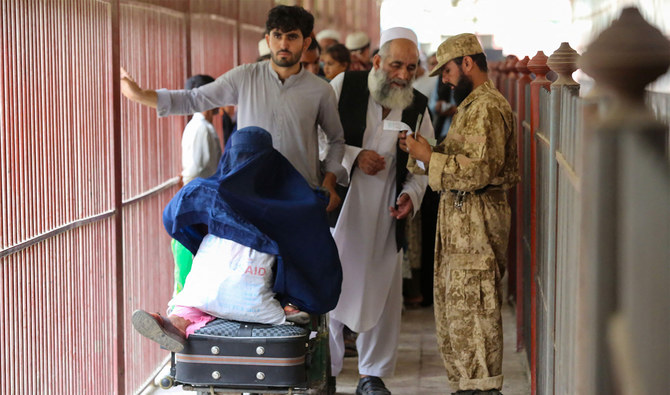ISLAMABAD: Pakistan’s caretaker prime minister, Anwaar-ul-Haq Kakar, said on Friday his country would return all “illegal” Afghan immigrants to curb smuggling of goods and foreign currency, in an attempt to strengthen the dwindling South Asian economy.
The development comes as Pakistan continues to face an economic slowdown for the last one year, with its foreign exchange reserves depleting, currency devaluing sharply and inflation rising to record highs.
The country, which barely averted a default in June by securing a crucial $3 billion International Monetary Fund (IMF) bailout, is desperately trying to curb power theft, smuggling and black-marketing of commodities to save precious foreign exchange.
On Friday, PM Kakar presided over a meeting in Islamabad to review progress on the government’s plan to crackdown on those involved in these illegal practices, particularly the smuggling of currency and goods.
“To prevent it, a very effective policy has been agreed upon. It has three categories, one [is relating to] those refugees who are registered and are our obligation under the international conventions and we will fulfill them at any cost. Second are the aliens who have no basis to stay here. Neither they have come on a visa, nor they have any legal documents,” Kakar told reporters after the meeting.
“The third category includes the ones who fall under the domain of identity theft who have gotten identity card by breaking into our system and other documents, which they were not legally entitled to. We have made a policy keeping these three categories in view and God willing, you will see it very soon that we will push back aliens because they have no right to stay on our soil.”
Pakistan first opened its borders to Afghan refugees in the 1980s after the beginning of a US-sponsored and Pakistan-backed ‘Afghan jihad’ to counter the so-called expansionist designs of the former Soviet Union, becoming the largest refugee-hosting country in the world.
According to the UNHCR, more than 4.4 million Afghan refugees have returned to their homeland since 2002 under a UNHCR-assisted voluntary repatriation program, but around 1.4 million still live in refugee camps, villages and urban centers across Pakistan.
In the last few days, police in Pakistan’s southern port city of Karachi arrested hundreds of Afghan nationals for allegedly residing unlawfully in the country. But a senior diplomat from Afghanistan and a human rights activist said that many of those apprehended possessed valid documents.
PM Kakar explained that today’s meeting was held to monitor what had happened in the past week with regard to synchronizing all actions against smuggling, hoarding and power theft, and how could they take forward this strategy.
He said his government had “zero tolerance” for smuggled goods.
“And an illegal industry of currency, our crackdown on that will be very consistent and this message should be conveyed repeatedly,” he said. “Whoever made investments in this illegal arena, I believe they will have to suffer huge losses.”
Asked about any relief to power consumers, the prime minister said it was linked with prices in the international market and beyond his government’s control.
“Things connected with the international market, that is a phenomenon which different states do not have any control over,” he said. “And we are also part of that global arrangement.”
Pakistan recently hiked fuel and electricity prices that sparked massive protests in the South Asian country, where people have been troubled by double-digit inflation for months. The hikes came as part of the conditions agreed with the IMF for the $3 billion bailout deal.















